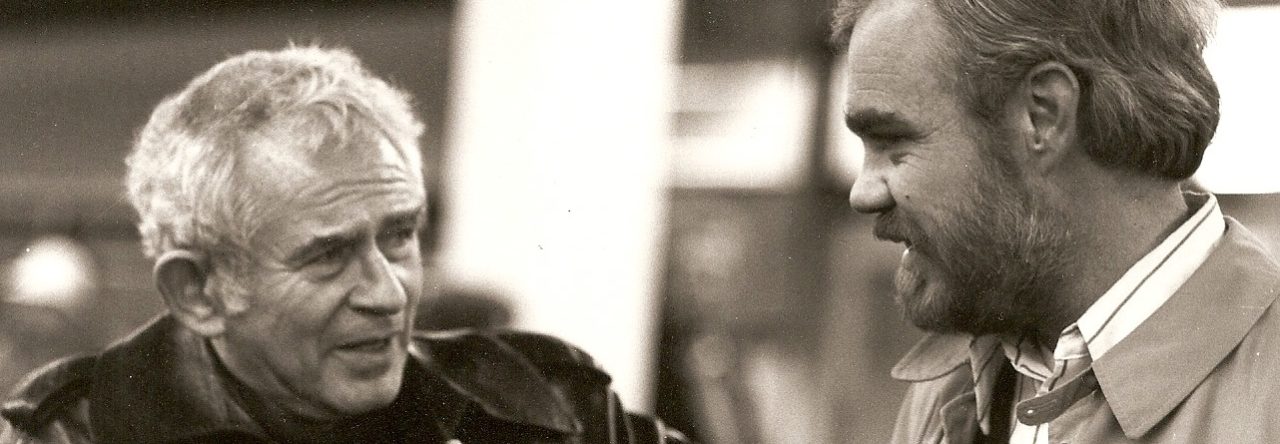J. Michael Lennon’s biography is the first that interprets Mailer from within, not as a public spectacle. Unlike his predecessors—Mary V. Dearborn, Peter Manso, Carl Rollyson, and others—Lennon was Mailer’s friend and collaborator; he has read 45,000 of his letters, and talked to an enormous population of friends and enemies, from gangsters to editors. He shepherds a prodigious variety of events into well-organized chapters, sometimes cluttered with irrelevant details like the names and addresses of movie houses where Mailer watched gangster films as a teenager.
Tag: review Page 6 of 8
A larger-than-life personality, Norman Mailer was a force to be reckoned with in his personal life—he knew many, many people—and as a voice in the American literary canon between WWII and the beginning of the twenty-first century. Any writer of a serious biography of Mailer who hopes to contain the excesses of the man within the covers of a book must know that since Mailer in his own lifetime grated on people’s taste and nerves, he could easily grate on the reader, even when presented within the pages of a biography. Lennon, authorized by Mailer before his death to write the definitive life treatment, performs a great task, letting Mailer’s obnoxiousness have free rein in balance with the biographer’s easygoing narrative style, which coaxes the reader into accepting and even enjoying all sides of Mailer—gregarious, notoriously thin-skinned, grandly egotistical, and monstrously talented. Understanding Mailer is only half the object of this welcome biography; its other intention is for readers to be enticed into reading or rereading Mailer’s works. ~Brad Hooper
On the afternoon of 10 April 2007 I was on a plane over the Atlantic watchingInfamous, one of the films about Truman Capote. It contains a scene where Truman and his frightful swans are discussing the Clutter family murder case. ‘Weren’t you scared going into their cells?’ asks Babe Paley (played by Sigourney Weaver), speaking of the murderers while sipping a martini and purring for the Upper West Side.
‘Well,’ he says, ‘it’s not as frightening as meeting Norman Mailer.’
Mailer was a generous friend who was known for helping younger writers and giving freely of his time and experience. He mellowed with age and ended famous feuds with Gore Vidal, William Styron and others. He had a big life, and Lennon’s biography is a big book, 947 pages and compulsively readable.
It could be said that Norman Mailer was a man and a writer halfway between fame and infamy and yet with little in the way of middle ground. He was, in varying combinations, a world-class drinker, feuder, provocateur, self-mythologizer and anti-feminist. He was a war protester, a mayoral candidate, a co-founder of The Village Voice, as well as a wife stabber, a serial husband (of six wives), and a father (of nine). He was a boxer, an actor, a filmmaker, a poet and a playwright. He was also a journalist and a novelist of enormous and singular narrative inventiveness and thrust, a two-time Pulitzer Prize winner, and one of the least boring and most tireless and tiresome public figures of the last half of the 20th century.
“I knew Mailer’s books the way Southern Baptists preachers know the Bible.”
When Norman Mailer spoke, you paid attention. Whether he was standing on a stage and speaking for an hour — without notes — on writing, or art, or politics, or in a manic monologue around a dinner table, or in a chance encounter on the sidewalks of New York or in an airport, you listened. Especially if you grew up idolizing him, as many of us did.
“Norman Mailer lived a big, brash, bawdy, belligerent life, and J. Michael Lennon has captured every moment of it.” So says author Gay Talese about Norman Mailer: A Double Life, written by Forsythia Lane, Westport, resident Lennon and published this month by Simon & Schuster.
In the annals of American literature, has there ever been a major writer more easily distracted than Norman Mailer? The author of such classic books as “The Naked and the Dead” and “The Executioner’s Song” had a penchant for tangents that took him, over the course of his 84 years, far afield of his chosen profession. “Mailer loved to drop everything, mobilize his energies, and launch in a new direction,” writes J. Michael Lennon in Norman Mailer: A Double Life, the first biography of the author to appear since his death in 2007.
Lennon’s central thesis is that Mailer, who died in 2007 at 84, long struggled with dual, and dueling, aspects of his personality: observer and activist, rebel and establishment figure, philanderer and family man, saint and psychopath, rationalist and transcendentalist.
